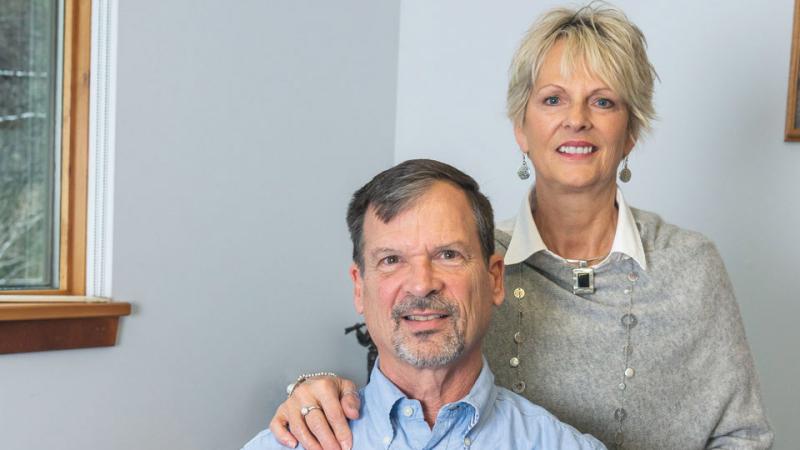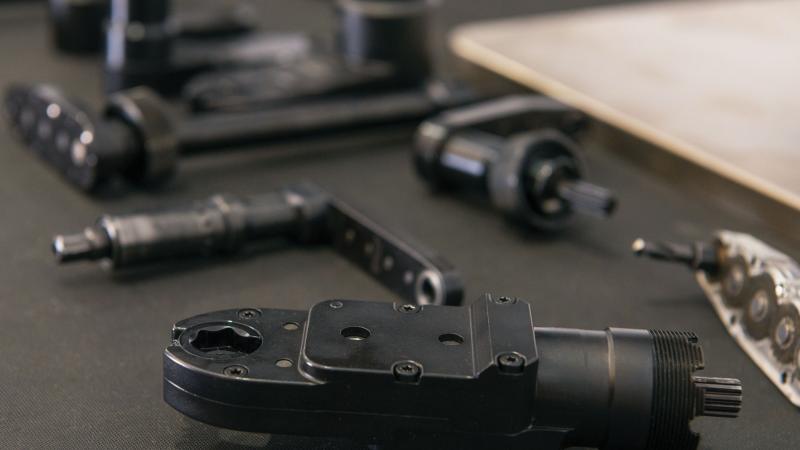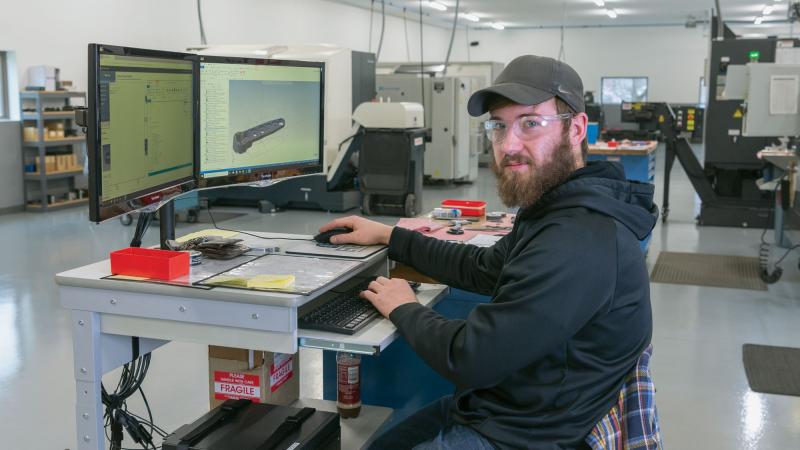Cutting-edge equipment and a skilled workforce find a common purpose in E-Tech’s clean and spacious manufacturing facilities.
Locally Grown, Globally Known
Published 03.04.2019

by Tom Wilson
Writer/Editor-Penn College News
Manufacturing precision power-tool attachments for the aerospace and automotive industries requires keen attention to detail and a substantial investment in quality, both of which are thriving in the industrious incubator that belies the serenity of rural Bradford County.
John M. Estep could easily take credit for the success of E-Tech Industrial Corp., given his parenting of the brainchild. He has attained five patents in a 42-year professional life, twice been a finalist for the Governor’s Impact Award and was a 2003 “Business of the Year” honoree by the Northern Tier Regional Planning and Development Commission.
Estep selflessly cites another factor in the flourishing enterprise he founded on Skyline Drive in Troy, an hour from his Williamsport Area Community College alma mater: the proud employees who daily give their all.
“When I started the company in 1999, it was ‘Me, Myself and I,’” the mechanical drafting alumnus said. “The business becomes your baby, but it doesn’t take long before you realize that you need help.”
Over the years, he has been joined in the front office by his wife, Nanette, and brother James, ’72, each of whom left another job to join the team, as well as a dedicated and like-minded corps that adds its unique skills to growing what “is very much a family business.” A couple of cousins are on board, as are a nephew and the Esteps’ three children: Nicholas, Jeremey and Natalie.
About two-thirds of the E-Tech workforce was educated at WACC or its successor. Jeremey earned a degree in toolmaking technology from Pennsylvania College of Technology in 2004; his sister studied business administration: small business and entrepreneurship concentration at the college in 2006-07. Nicholas holds a degree from Edinboro University.
“We’re a bunch of ‘ordinary guys,’” Estep said, “and when you put us all together, we do extraordinary things.”
So extraordinary, in fact, that only a handful of businesses worldwide do what E-Tech does: develop and manufacture attachments that reach limited-access areas where a traditional power tool can’t fit.
State Sen. Gene Yaw, in whose 23rd District the manufacturer is headquartered, toured the facility last year and was impressed with what he learned.
“I had heard about the business for years, but actually seeing the products made was truly an eye-opener,” said the legislator, who also chairs the college’s board of directors. “I commented to John, ‘Your company makes tools to quickly tighten bolts and nuts on an assembly line that do-it-yourselfers can only accomplish with a small wrench and skinned knuckles.’”
“Yes, that’s our business,” Yaw was told.
The seeds of that venture were planted in the 1970s, when Estep was a student at Troy High School. Affordable tuition was one factor in his postsecondary choice – in those days, the cost of a WACC education was split equally among the student, the state and the respective sponsoring school district – but the degree offerings were also attractive.
“You kind of gravitate toward your passion,” he said of his decision to attend classes in Williamsport. “I had three years of mechanical drafting and always enjoyed drawing and designing something. That’s what drove me to that curriculum and that particular college.”
Among the faculty who fed his ambition were Jackie E. Welliver, who died in February 2009, and Chalmer Van Horn, who remains connected to the institution through philanthropy, volunteerism and frequent visits.
E-Tech’s team approach to business begins with the couple that built it: John, ‘74, and Nanette Estep.
Only a handful of businesses worldwide do what E-Tech does: develop and manufacture attachments that reach limited-access areas where a traditional power tool can’t fit.
Precision-designed parts, meeting the rigorous standards of industry, bear the company’s mark of quality.
As Estep’s 1974 graduation loomed, he entertained offers in Texas and New York state. Then, at the serendipitous 11th hour, an instructor said Ingersoll-Rand was hiring if anyone was interested. Eight students made the trip to Athens for a group interview; Estep was one of two who were hired.
He packed everything he owned into his car on a Friday afternoon and began work three days later – first in general engineering, and within a few months, in product development.
During his 25-year career there, he patented a valve system for a small-die grinder, a retaining-pin module for a power tool, an electronic push-to-start nutrunner, a tube-nut wrench and a pneumatic power tool. Estep also traveled to San Francisco to accept a gold-medal award for product development from Design News magazine.
As the 21st century neared, however, the writing on the wall was coming into focus. Ingersoll-Rand was diversifying its output and planning to move the engineering staff to New Jersey. A lifelong Bradford Countian, Estep did a lot of soul-searching before opting to stay in the area.
He had been a liaison for Lubbering GmbH, a small company in Germany with no presence in the United States, and approached the manufacturer about an operation in North America. Lubbering was looking for someone who knew the technical side of the product line. Someone with business sense. Someone who knew the market. Someone exactly like Estep.
He left Ingersoll-Rand with the January 1999 founding of Lubbering Corp., and for the next 18 years, Estep built a company that reached international status from its bucolic home office. The relationship with Lubbering ended in June 2017, and E-Tech was relaunched as a fully independent, made-in-the-USA company.
“Everything we do in the business is for the next generation,” he said. And when it comes to investing in human capital, Estep clearly walks the walk. An initial expansion added 5,500 square feet of manufacturing space and nearly doubled the workforce to 29.
“Today, 95 percent of our manufacturing is done in-house, with the exception of some heat-treating and finishing,” the business owner explained.
E-Tech has a full line of aerospace products – passing the stringent certification requirements of no less an industry giant than Boeing – and has a complete catalog for its automotive customers (which include General Motors, Chrysler and Ford).
He has offered a number of internships to Penn College students. Two of the most recent – Anthony R. Bastion, of Millerton, and John M. “Max” Brenchley, of Canton – began full-time E-Tech employment upon graduating in December with degrees from the college’s School of Industrial, Computing & Engineering Technologies.
And in the fall, he enrolled two employees in the college’s state-renowned apprenticeship program for computer numerical control occupations.
All of which adds up to an operation forged from the same ingredients as its products: longevity, reliability and uncompromising performance.
“E-Tech is an outstanding example of the innovative thinking that Penn College and its predecessor institutions instill in their students,” Yaw said. “The result is a business with an international reputation, located right here in northcentral Pennsylvania.”
Anthony R. Bastion, a 2018 manufacturing engineering technology alumnus and former intern, is among the Penn College-educated talent to find a home in his Bradford County backyard.




Share your comments
Penn College Magazine welcomes comments that are on topic and civil. Read our full disclaimer.
We love hearing from you